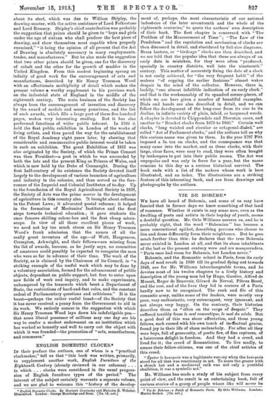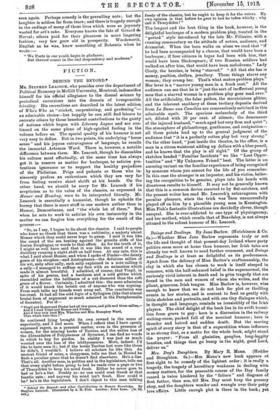VIE DE BOHEME.*
WE have all heard of Bohemia, and some of us may have fancied that in former days we knew something of that land
of romance. Whether it exists in any sense now, even as the dwelling of poets and artists in their heyday of youth, seems a doubtful question. Mr. Orlo Williams assures us, and he is probably right, that the word "Bohemian" has become a mere conventional epithet, describing persons who choose to live and dress differently from their neighbours. But he goes much further than this : he declares that the true Bohemia never existed in London at all, and that its sham inhabitants of the last or the present century were and are masqueraders. " Paris once had room for Bohemia, but London never."
Bohemia, and the Romantic school in Parie, from its early days of mad revolt in 1830 till its gradual dying out towards 1848, are for Mr. Williams interchangeable terms, and he devotes most of his twelve chapters to a lively history and description of the young men led by Hugo, Gautier, Alfred de Musset, Roger de Beauvoir, Gerard de Nerve], Petrns Borel, and the rest, and of the lives they led in corners of a Paris hardly now to be recognized. The rank and file of this romantic army, unlike some of the leaders, were mostly very poor, very enthusiastic, very extravagant, very ignorant, and not always very happy. On the contrary, their historian describes them as "often on the verge of despair." They suffered terribly from le mal romantigue, le mal du sit cle. But a good deal of this was sheer affectation, and these young fellows, each cursed with his own touch of ineffectual genius, found joy in their life of sham melancholy. For after all they Were boys, fall of generosity, of poetic fire, of fine raptures, of a boisterous delight in freedom. And they had a creed, and lived for it; the creed of Romanticism. To live madly, to amaze their fellow-citizens, was one of the chief articles of this creed.
" kaater le bourgeois was a legitimate war-cry when the bearaeais atood for all that was reactionary in art. To scare the grocer with a slouch bat and a mediaeval oath was not only a youthful ebullition, it was a symbolic act."
Mr. Williams has made a study of hie subject from every ifoint of view, and the result is an entertaining book, full of curious stories of a group of people whose like will never be
6 Vie le Bohinte : a Patch. of Romantic Paris. BY Orlo Williams. London Martin Becher. [15i. net.]
seen again. Perhaps comedy is the prevailing note; but the laughter is seldom far from tears; and there is tragedy enough in the endings of many of those lives which were so joyously wasted for art's sake. Everyone knows the fate of Gerard de Nerve'; others paid for their pleasures in more lingering fashion; very few grew old in prosperity. Wordsworth, English as he was, knew something of Bohemia when he wrote:—
" We Poets in our youth begin in gladness ;
But thereof comes in the end despondency and madness."































































 Previous page
Previous page